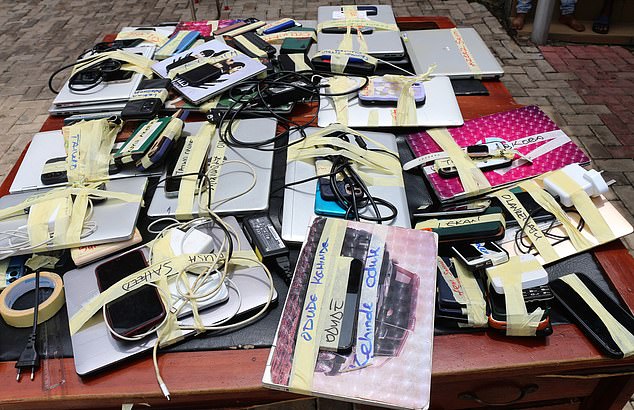Luxury cars and a millionaire lifestyle, the evil Yahoo Boys gang targeting children across Britain and the world
Videos online show them posing in front of luxury cars or decked out in designer clothes, flashing piles of money.
They look - to all intents and purposes - like modern-day millionaires.
However, the individuals bragging about their wealth and gaudy possessions online are said to have made their riches through the manipulation, extortion and torment of people - many of them children - around the globe.
Welcome to the world of the Yahoo Boys - a nebulous group of gangs and nefarious individuals based out of Nigeria that create fake online personas and use them to target victims.
How many crooks involved is impossible to tell but just this week Meta shut down 63,000 accounts on its social media platforms Instagram and Facebook that were connected to the Yahoo Boys.

Members of the Yahoo Boys gang pose beside their luxury cars
Meanwhile, police raids in Nigeria have at times seen as many as 37 individuals arrested in a single day.
The suspects have been made to pose for police photographs, standing in front of an array of luxury vehicles they are accused of buying with their ill-gotten gains.
In each of their hands they held either a laptop or a mobile phone - the tools of the illicit trade.
The Yahoo Boys are part of a worldwide community of scammers posing as young men and women online in order to dupe people into sharing sexual material before using it to extort money from them.
They are said to send ‘thousands’ of British, American and Canadian youngsters friend requests or messages from fake or hacked female accounts in the hope that a few dozen might respond.
In December of last year, 16-year-old Murray Dowey from Dunblane committed suicide after falling prey to a sextortion scam.
Police Scotland believe those responsible were based in Nigeria. Worryingly, the tactics used by these criminals are becoming ever more sophisticated.
The Yahoo Boys have even started using AI to create so-called ‘deepfakes’ to trick even the most alert internet users.
Over the last two years, the criminals have been experimenting with deepfake video clips and video calls.
The technology changes their facial features and voice, allowing them to take on the appearance and sound of anyone they like.
According to US news outlet CNN, a Hong Kong-based finance worker handed over $25 million in February to scammers who used deepfakes to impersonate chief financial officers.
And the problem is growing at a terrifying rate. The number of global sextortion cases reported to the US National Center for Missing & Exploited Children more than doubled in 2023, rising to 26,718 compared to 10,731 the year before.
The Yahoo Boys are a sizeable element in a worldwide issue.
The long-used nickname comes from the email service Yahoo, which became popular in Nigeria in the 2000s, and was used alongside other email providers in their scams at that time.

Equipment seized from members of the Yahoo Boys gang

Gang members in an ‘office’ in Nigeria from where they lure victims from around the world
However, while those involved might share tips and tricks with each other, they are not a unified cybercriminal group but rather operate individually or are structured in small groups.
According to research from the Network Contagion Research Institute (NCRI), which works to identify and forecast emerging cyber threats, the Yahoo Boys are increasingly targeting teenagers from Western English-speaking countries via social media platforms.
An NCRI report stated: ‘Specifically, nearly all financial sextortion attacks on minors involve the screenshotting of the victim’s Instagram followers/following lists and using those lists as leverage, threatening to send the victim’s intimate photos to all these accounts.’
Little has been shared about the specific individuals behind the current explosion in sextortion.
However, there are many videos posted online of people who are purported to have made vast sums of money from such scams. They are said to flaunt their ill-gotten gains and pass on tips to other would-be crooks.
The NCRI has said that celebrating sextortion crimes is an established part of the internet subculture in Nigeria.
Suspects are often identified when they are found to be living lavish lifestyles without any known means of income.
Those arrested have been found in possession of high end cars, including several brands of Mercedez-Benz, Lexus, and Toyota as well as expensive mobile phones.
This life of apparent luxury is a temptation for many young people in the impoverished country.
Nigeria is currently experiencing its worst economic crisis in a generation, leading to widespread hardship and anger.
According to the BBC, some people in the north of the country are now eating the rice that is normally discarded as part of the milling process or is used as fish food.
The director of Nigeria’s National Cyber Crime Centre (NCCC) has defended his police force’s actions, and insisted it was working hard to crack down on the culprits.
He said Nigerian teenagers are also being targeted, and has argued that the criminals were not just a Nigerian problem, with other sextortionists in south-east Asia.
As such, he said there should be a global effort to tackle the issue.
Last month, he and his team visited the UK’s National Crime Agency to improve collaboration on sextortion and other cyber-crime investigations.
However, as governments and police forces around the world grapple with the issue, the scammers continue to target the vulnerable.
As one former Yahoo Boy told The New York Times, the impact of their activities is not enough to stop even thos with some semblance of a conscience.
While he confessed to feeling guilty about the practice, he added: ‘But poverty will not make you feel the pain because you need the money.











































































































































































































































































































































































